The Journey to Reopening: Real Stories from Chinese Business Owners
Till this day, at this moment, we still wonder what is really happening.
Being in China, we have been quarantined for almost two months and are now witnessing social and economic activities resuming slowly, bit by bit, in our hometown Beijing. Meanwhile around the world, at least according to news sources we could get, things are happening the way as in China two months ago. Chaos. Panic. Heart-breaking stories. Uncertainties. Disappointing politicians. Suffering citizens. Desperate medical workers. Deadly numbers. Unclear future.
SEE ALSO: How Chinese Tech Companies Combat Coronavirus with Digital Solutions
We’ve never been this f*cked up as a species, but we’ve never been this united, sharing a common ground, and a common feeling.
We kept thinking about what we should write about in a time like this. In a time that everyone is trapped at home and worried, what is truly meaningful? Do people still care about anything, except personal health and safety? (which are definitely the most important things right now, of course)
In a messy time like this, we decided to talk to people around us. In today’s article, we want to share our conversations with three Chinese friends who are business owners. Over the past two months, they panicked, suffered, and are now trying everything they can to get things back on track, even if it is still a difficult mission. It is human nature perhaps; the inevitable has happened, but we still haven’t lost faith, even if faith hasn’t seemed to help so much in the current situation.
We will get through this, through losses, pains, and sufferings. So much would be changed by this pandemic, but some same old things would remain the same: we are all human, we all want to provide the best for people we care about and want to work the hardest to prove our own worth.
We hope these stories help, even if just a little bit, to let you know that there is hope, and hope is a paradox that us human would never give up on.
Life will be difficult after this pandemic; but life also goes on, as our friends tell us.
Lun, restaurant owner based in Shenyang and Xi’an
My partner Bo and I started our restaurant business three years ago. Today, we have 5 restaurants in Xi’an and 8 in Liaoning, employing over 500 people.
The Chinese New Year holiday was supposed to be the busiest week for the restaurant business. So naturally, we stocked up at all our locations with a lot of food materials in advance, preparing for the following week. At that time, although we had heard news about the mysterious virus occurring in Wuhan, none of us expected it would bring such a devastating change to our industry, to the nation, and now the entire world.
The bad news hit on January 25th, the first day of the Chinese New Year. The government sent out official notice ordering the complete shut-down of dine-in service at all restaurants. It was devastating for all of us in the business; not only were we losing a huge potential amount of income, all the food we stocked up were just lying there, rotting. We quickly came up with a plan to let our restaurant managers sell our stocked material to the public. In those early days of national self-quarantine, everyone in China was in panic mode, and was eager to stock up food as supermarket supply sometimes failed to keep up.
It was a funny couple of days. Our managers, along with employees from many other restaurants all went out to the streets to sell groceries together – even high-end hotels such as Westin were with us. You seldom see people selling stuff on the street in Chinese cities these days as it is considered bad for city appearance, but during that special time, the urban management folks (城管, who have the frightening reputation of chasing around vendors in cities) let us off the hook.
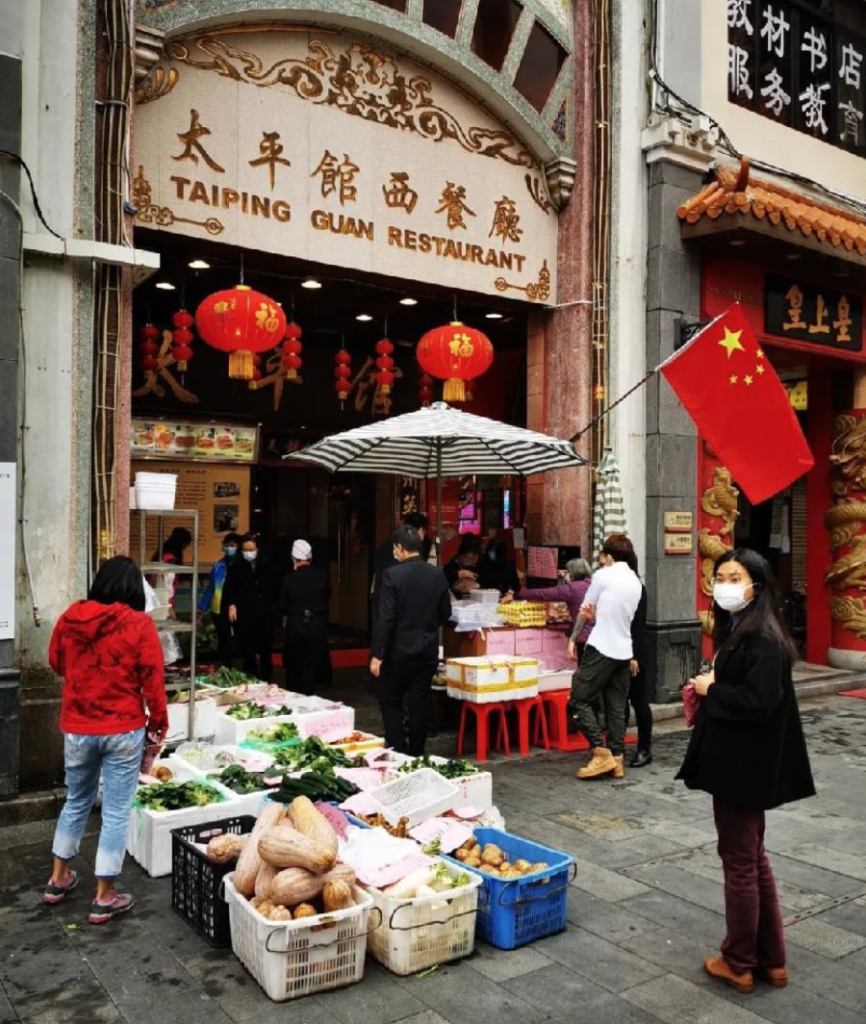
Apart from the pre-stocked food, another big expenditure was labor. We didn’t lay off any of our staff, but we couldn’t afford to pay them full-wage either. Luckily, Hema, Alibaba’s offline grocery chain, decided to offer an “employment-sharing (共享员工)” plan with restaurants. When I saw the news, I immediately jumped on the opportunity to contact Hema. During national quarantine, sales at grocery platforms like Hema increased dramatically, making their stores short-handed. Thanks to this plan, some of my employees were loaned to Hema to work as part-time delivery-persons. They earned 15.5RMB per hour there, very close to their earnings at our restaurants.
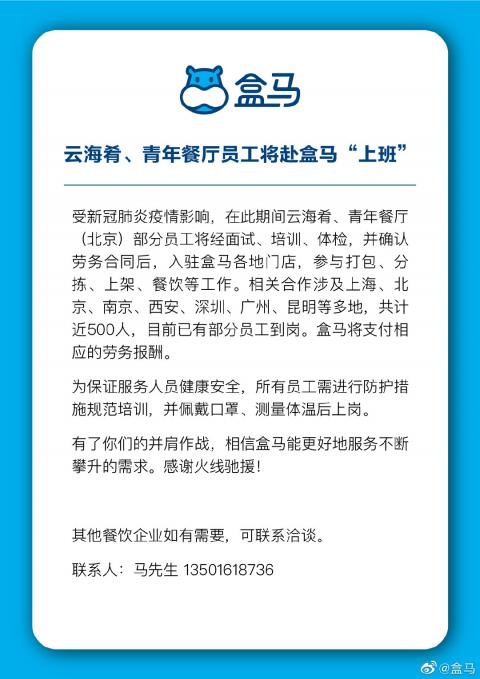
February and March were supposed to be peak season for us. Normally we would be expecting around 6 million RMB of income from our 13 restaurants in those high-volume months, but instead, this year we lost 2 million RMB in rent and labor costs. Some of our landlords, mainly shopping malls, exempted a portion of our rents according to local policies, but frankly they lifted only a fraction of our burden.
After nearly two months of shutdown, the restaurant business is now gradually coming back to life. Every city has different regulations about how restaurants must operate after resumption, so business performance varies. In Shenyang (the capital city of Liaoning Province) for instance, our revenue has been restored to about 50% of the pre-quarantine rate since reopening in late February, which is better than I expected. Xi’an is a different story though; after reopening in early March, the revenue flow is only 20% of normal times.
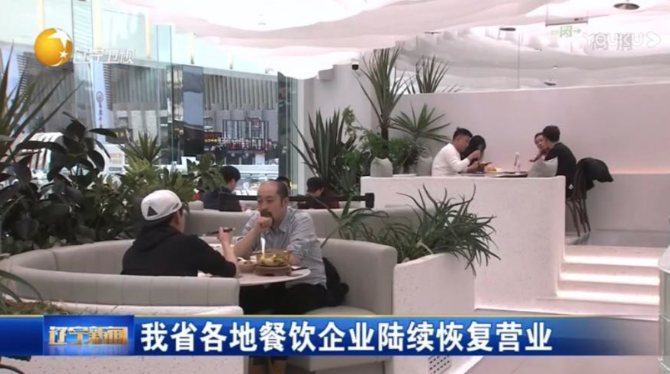
Since our businesses are based in two provinces, I could easily tell the local governments’ different attitude towards work resumption. In Liaoning province, things are resuming to normal thanks to a collective top-down effort. Local media outlets are reporting news of business reopening all the time, and some officials took the lead to dine at restaurants, encouraging citizens to go out and contribute to economic recovery like they did. In Shaanxi Province however, the government is doing much less, not pushing hard enough for work resumption as they should be. We saw in the news that the party secretary of Xi’an (capital city of Shaanxi Providence) encouraged local businesses to reopen “at an appropriate time”, but aside from verbal assurance, they haven’t issued any official instructions, or what we refer to as “red-headline documents” (红头文件), to the local level. With such ambiguous actions, business owners could choose to reopen at their own risk, but the authorities would bear no responsibility if anything bad happens. Such attitude truly disappoints us.
Right now, all of our restaurants are reopened, but we are still a long way from full recovery. During the early days of shut-down, we built a model to adjust the restaurants’ work shift schedule based on the expected workload for the next day, in this way, we could ensure only the minimal number of employees were taking shifts. The model has helped a lot in optimizing our labor cost, and it is a strategy we would not have thought about if not because of the pandemic. I guess that’s a silver lining, at least.
Before the pandemic, we had a pretty ambitious expansion plan this year with the hope of opening up more locations, but now that’s far out of our head. We have been lucky enough to survive this trauma as a business. At least 10% of restaurants have already announced bankruptcy, and more will follow this year for sure.
A few days ago, I noticed that the public bathhouse I frequently visit in Shenyang was reopened for business (as a north-easterner 东北人 public bathhouse is a huge part of our lives), and that seems to be the sign of the light at the end of the tunnel. If people are ready to get scrubbed in public spaces with friends and families, we are really to get our normal life back, right?

Jia, bar owner in Beijing
I currently own two bars in Sanlitun, the most popular nightlife destination in Beijing. I’ve always loved drinking and socializing, so I opened my first bar in 2014 with a friend. After 5 challenging years of running the business, my bars are now rated 5 stars on Dianping (the Chinese equivalent of Yelp) with almost 1000 comments. Now both of them have been shut down for over 2 months, and I still have no clue when I could reopen for business.

My initial plan was to close for business from January 22nd to the 29th and reopen in the last few days of national holiday. But on January 23rd, two days before Chinese New Year, I realized something was going wrong. The increasing report of coronavirus in Wuhan was reminding me so much of SARS in 2003, a national tragedy that I personally experienced as a teenager. On the day Wuhan announced lockdown, I told my employees to postpone our re-opening to February 10th. How naive was I! In the following weeks, bad news just kept coming, the confirmed cases kept rising, and the lockdown restrictions kept tightening. By early February, I finally came to terms with the reality that this is going to be a long fight, and reopening my business is not happening soon.
Now two months have passed. Although it seems like China is at the end of this pandemic fight, I don’t see my bars opening anytime soon. Social and leisure facilities such as bars, clubs and cinemas are not considered essential from the official’s perspective, so it is normal for us to receive orders for reopening last. Moreover, my bars are located in a building for both commercial and residential use, which means only residents could visit the building until neighborhood restrictions are lifted. Lastly, given that Beijing is the center of China’s economy and politics, I expect it would be the second to last city in China (the last being Wuhan) to fully go back to normal. Just look at the city’s traffic: once the usual pain-in-neck traffic jam comes back, I would consider our life is really back on track.

I am still paying full wages to all my employees despite the fact that they are not working. The wages and rent combined are costing me 100,000 RMB per month. Our business’s cash-flow could only last for 2 more months, so I will I have to pay out of my personal savings once cash dries up.
As a business owner, the situation certainly feels very painful and hopeless, but as a Chinese citizen, I feel that it is my duty to shoulder the burden for my country. The country has lost so much because of this pandemic, in comparison, my personal loss is nothing. In fact, paying my employees and keeping my business alive is the only thing I could do to help my country, so I will do everything I can to persist no matter how much worse my personal finance gets.
I believe this pandemic has taught all of the bar owners in China a valuable lesson. In the past few years, new bars popped up at an unprecedented rate in first and second-tier cities with often very poor qualities. By choosing a popular site, hanging up some social media-friendly decorations and providing a standardized cocktail menu, it was usually not hard to make a profit soon. We used to have the mindset that once you make back the initial investment, you should quickly choose the next site to invest in and expand. Now the tide has completely turned, the hot-headed speculators are being eliminated, only those operating with enough caution and determination could survive. Being conservative is certainly the best strategy right now, I would say.
Stevie, fitness studio owner, Beijing
Around January 20th an indoor cycling studio in Beijing posted notification that they would be closing early for national holiday. Back then news about coronavirus were already popping up quite frequently, but no one I knew took it seriously. Thinking back now, that cycling studio owner, a foreigner, probably got some early news source regarding the severity of the pandemic before the rest of us in Beijing’s fitness industry.
My business partners and I weren’t aware of the situation at all. Our original plan was to close our studio briefly over Spring Festival for 5 days, then reopen on Jan 28th. Fitness classes are always in high demand after national holidays, so we wanted to utilize this time period to resume business as quickly as possible.
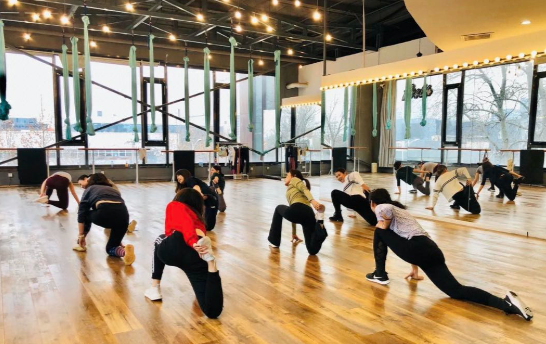
About three days after Chinese New Year, I realized we had to postpone our reopening time. There was no government notification yet but seeing all the other gyms and fitness studios posting announcements, we naturally had to do the same. At first, I hoped to delay perhaps for a week, reopening again in mid-February, but that soon turned out to be impossible. As a small independent business, we could only rely on our own interpretation of the situation to determine our next step, and the situation was apparently disastrous. We waited like everyone else, staying at home, browsing news, counting our losses without knowing what to do.
One evening in early February, my husband suggested casually while playing video game, “Why don’t you try teaching online classes through WeChat? People might want to exercise together.” I had a lot of time to kill at home anyway and seeing that there’s nothing else we could do to bring business back to normal, I decided to give it a try.
For almost two weeks, I offered free online classes at home. The organization was pretty casual: everyday I’d ask members in our WeChat group if anyone wanted to work-out together, I then invited those who said yes to a group-chat, announcing a time to “cloud-exercise” (云锻炼) through video. At first there were quite a lot of technical problems; the signal reception in my house wasn’t stable, resulting in poor image quality and sometimes even a complete loss of connection. Luckily, members who participated were all very tolerant of these initial difficulties. People seemed so happy for an opportunity to exercise together, or maybe they just want to see other people and say hi to each other through the phone screens, in this lonely time of home quarantine.
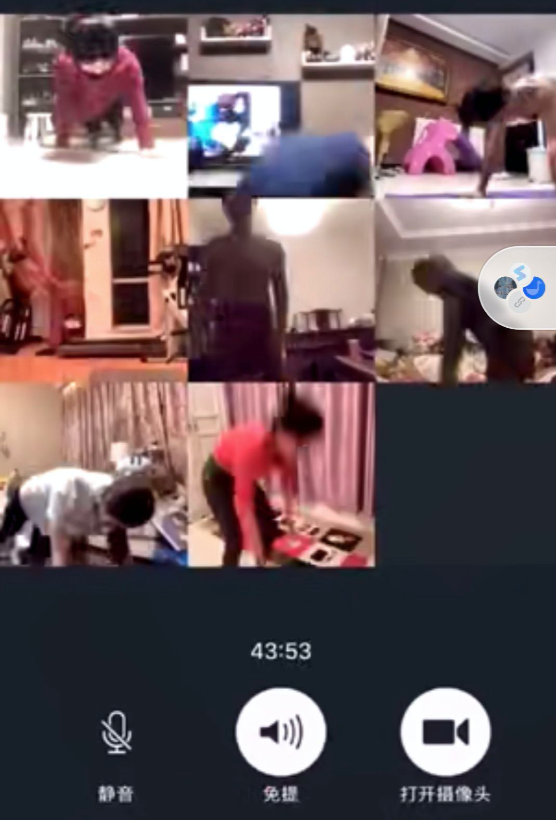
From mid-February to this day, I’ve been busying teaching and arranging online classes at home. We now offer 3-4 online classes per day, ranging from HIIT, Yoga to dance. Classes are taught through the Tencent Meeting app and are charged half of the price for our normal studio sessions. I decided to still pay our teachers the same rate despite the fact that our monthly income has dropped by more than 2/3 of normal. Comparing to other offline businesses such as restaurants and cinemas, we are already beyond fortunate to at least have an income flow, even though it barely covers our rent.
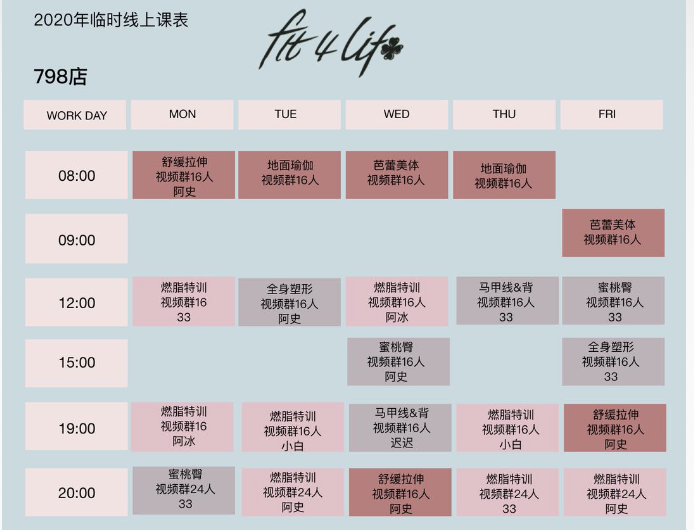
Online classes are a good supplement, but they are difficult to attract new customers and cannot replace the social atmosphere of real group classes. Like all the other private business owners, I have been paying extremely close attention to official updates and local news in the hope to know when we can reopen. As I’ve said, we were just a small, independent studio in Beijing, so I never had any direct contact with officials or people with inside information. Finally, about two weeks ago, I saw a notification from our district’s Bureau of Sports, which called for an “orderly restoration of fitness businesses at a reasonable pace”. The notification provided a list of contact person for each subdistrict, so I immediately reached out to call. The person directed me to join a WeChat Group, where hundreds of local fitness business owners were already members, communicating with local officials and receiving orders.
Here’s the interesting and difficult part of the situation: although officials were responsive and patient, they never gave the exact word about when or how each business could be qualified to open. All they did was provide vague guidelines and asking us to contact people at a more local level, in this case, the subdistrict office (街道办, the most local administrate division of CCP) and the property management company. In the past two weeks, they came to inspect the condition of our studio multiple times, each time pointing out new problems and giving new orders. The inspectors agreed that the size and sanitization standard of our studio met the official requirement for reopening, but none of them was willing to give me a clear go-ahead. It seemed to me that they were either afraid of taking personal responsibility or had no actual power to give the order.
And sometimes the officials have fights among themselves. One day last week, a group of subdistrict officers came for a daily inspection. One lady told me that we have to hang an “exercise guideline” document on our front door, indicating the specific sanitation steps for each member entering the studio. A guy in the group immediately objected, specifying businesses like ours are not required to do so. They argued quite a bit and left without conclusion in the end.
To be honest, I don’t blame these people. This is a situation that none of us have ever experienced, and the officers dread it just as much as us business owners. Everyone was simply trying to do their jobs and interpreting guidelines passed down from their higher-ups. As the way things are in China, there are a lot of personal interpretation required in making decisions based on unspoken understandings rather than clear instructions.
So, after a lot of interpretation and careful preparations, I’ve finally decided to reopen our studio next week, instituting some careful measures: only 1-2 classes per day, less than 6 members each time. During classes, people will have to stand 2 meters from any other person and everyone must wear protective masks at all times. Those who attend will have to show their travel itinerary over the past 14 days, proving that they have completed quarantine. Of course, we will also conduct temperature checks for everyone, and disinfect our classroom after each class.
We have to keep things low-key, specifically, not letting other studios or gyms in the area know that we are reopening. I don’t interact with folks in our industry a lot but judging from what I’ve witnessed in that WeChat group, people have the nasty habit of picking on and reporting each other. Several times I saw some business owners directly call on the name of another gym, asking officials why they are allowed to open while others are not. Those guys are truly stupid; they have no idea we are stuck on the same boat as a team, not as competing individuals.
From what I see, most gyms in Beijing are preparing to reopen in the coming weeks, gradually and cautiously. No one wants to risk anything, but what else is left if we don’t take risks? At the end of the day, businesses like us have to survive on our own, and right now, the only thing that helps us to survive is to reopen, even at some risks.

The article was originally published on Elephant Room.






